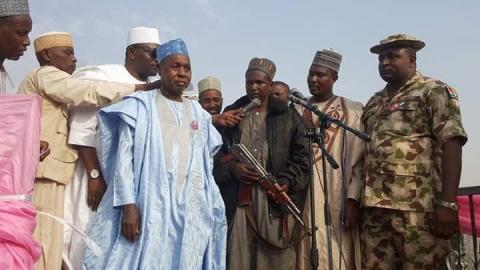
Senior Advocate of Nigeria, Ebun-Olu Adegboruwa, and Ex-Vice President of the Nigerian Bar Association, Monday Ubani, in interviews with SaharaReporters share their view on recent peace deal made by Katsina and Zamfara states with bandits who have continued to terrorize the region.
Senior Advocate of Nigeria, Ebun-Olu Adegboruwa, and Ex-Vice President of the Nigerian Bar Association, Monday Ubani, in interviews with SaharaReporters share their view on recent peace deal made by Katsina and Zamfara states with bandits who have continued to terrorize the region.
Ebun Olu-Adegboruwa
Criminal law is within the concurrent legislative list of the constitution, which means that when it comes to matters relating to crime, both the federal and state government have the jurisdiction to determine the issues relating to crime.
If there are offences committed against federal laws, the federal government will prosecute. If it is an offence against state laws, the state government will prosecute. In that regard, it would depend on the nature of the criminality in the respective state.
The Administration of Criminal Justice Acts allows parties to explore the possibility of plea bargains and discussions towards resolving issues between themselves.
When the matter has graduated to the extent of communal violence leading to the death of unarmed civilians, terrorism, levying war against the people, I think that every governor should be wary of negotiating with bandits so you don’t end up empowering them even before the so-called negotiations.
So, in this regards, concerning what has happened in Katsina State, where amnesty was declared for bandits and they were paid huge sums of money in Zamfara, only to empower them to wage more dangerous war against the people, that should send a signal that the state is appearing weak against criminals and bandits and that should not be the case.
The government has the instrumentality of war and power, the armed forces, navy, police, army, and even the regular forces such as NSCDC.
I support that the government should pursue peace but they should not be made to look like they are negotiating on a weak platform as the experience so far has not produced any meaningful result. All the negotiations made with Boko Haram had backfired in the sense that all the money paid to them has ended up empowering them more than before.
I support, generally, negotiations but with people who have a genuine desire for peace unlike what is happening now.
In the Niger Delta, when amnesty was introduced, people laid their arms and forsook blowing down pipelines and we don’t have any experience of pipeline vandalism thereafter for a long time. Those were the kind of negotiations that people prefer. On the side of the bandits so far, they have reneged all the agreements they have with the government. So, I don’t think it’s proper to continue to pursue bandits that make the government look like it’s a weak party.
Monday Ubani
A bandit is a criminal and do people negotiate with criminals? You negotiate with people of course due to some factors that are not within your knowledge.
It is the circumstance and the position that you are that will either determine whether you want to negotiate or you don’t want to. If you are in a position of strength, of course, there is no way you will negotiate with a criminal but if you are in the position of weakness, you try to negotiate. Nations negotiate when they are in a position of weakness and they know that collateral damage would be done to the citizens.
But ordinarily, a criminal is a criminal, agreeing with him in his crime means you are supporting what he is doing. Negotiating with a criminal is relative and it depends on which position you are. If you are in the position of strength, you should inflict collateral damage on the criminal.
The state and the federal government should know their relative strength with regards to the bandits. If these bandits (in Zamfara and Katsina) have not kept to their promise, it is up to them and the people who elected them should hold them accountable whether they have done well in negotiating and continuing to re-negotiate.

The constitution gives the government the primary responsibility of catering for the welfare and security of the people and that includes local, state and federal government. The federal government should be able to deploy all the forces there to protect lives and property.